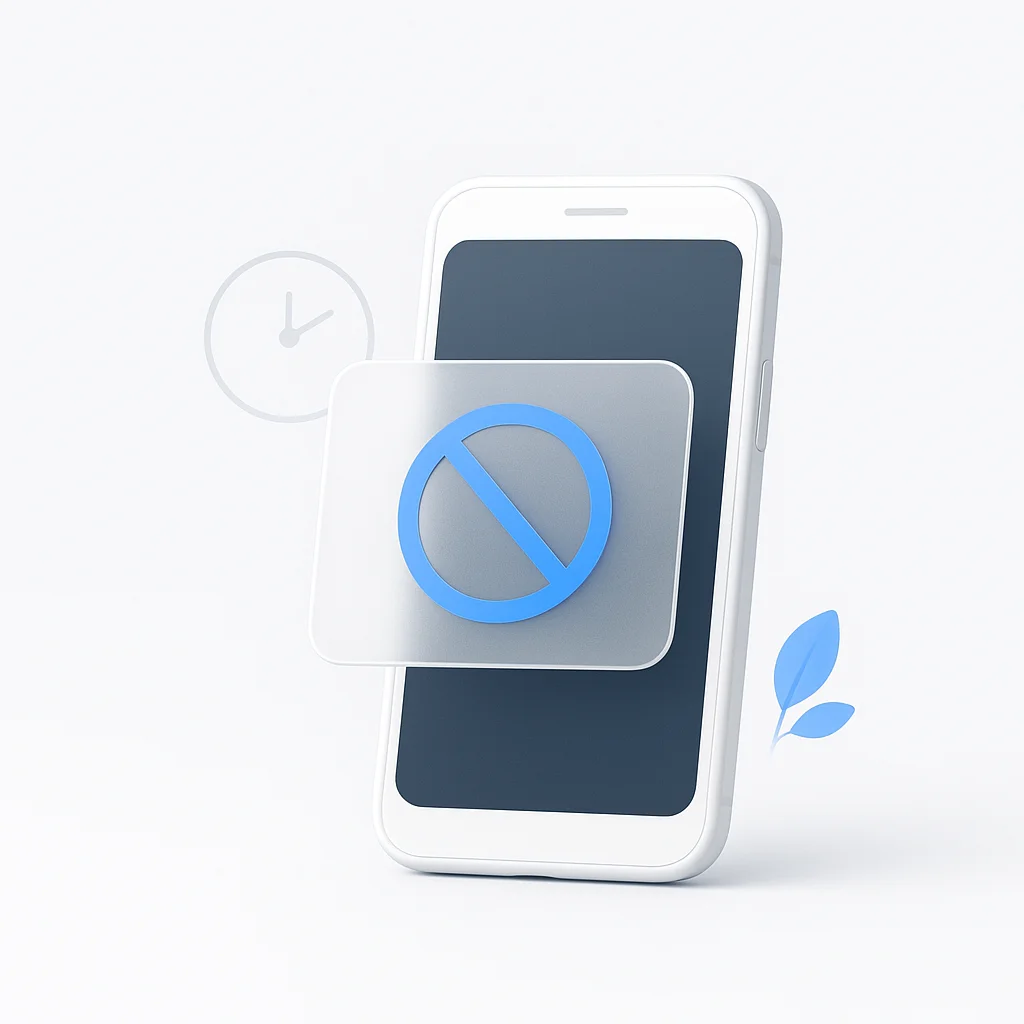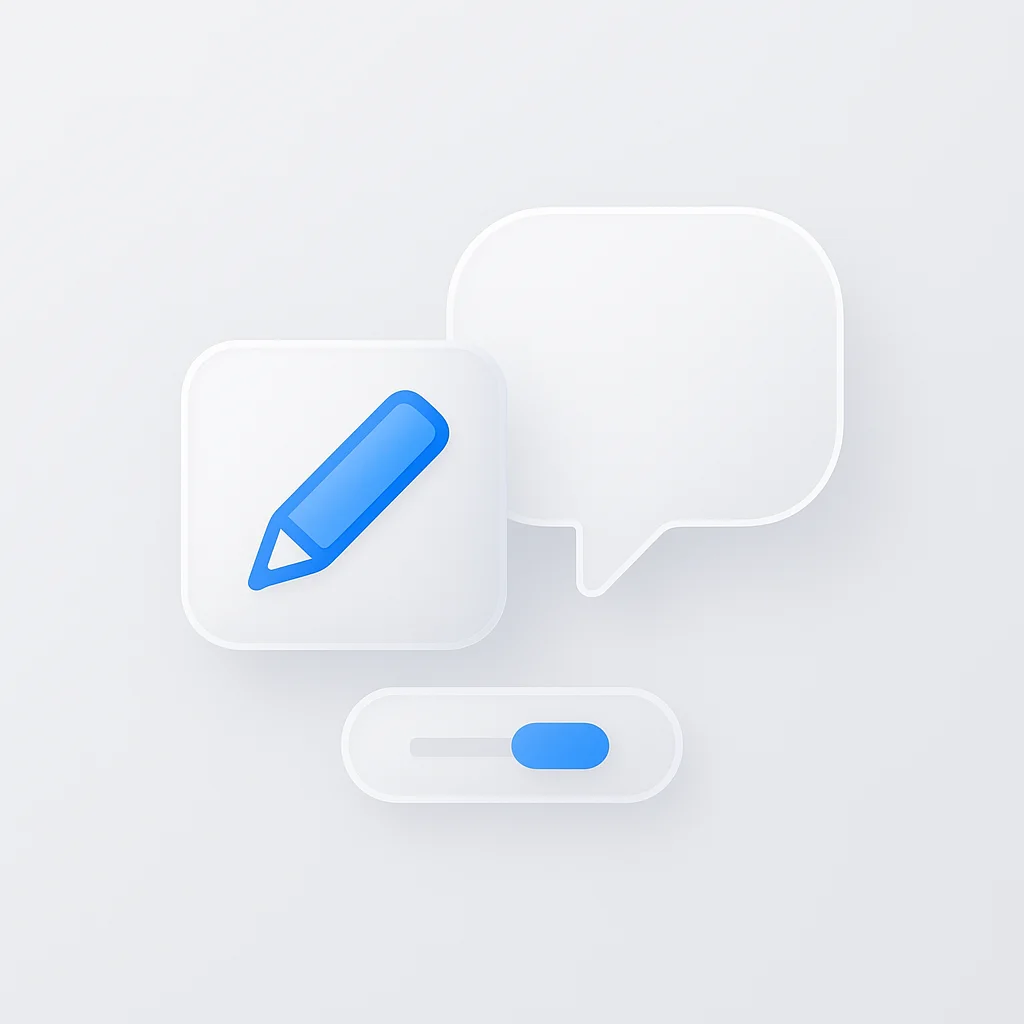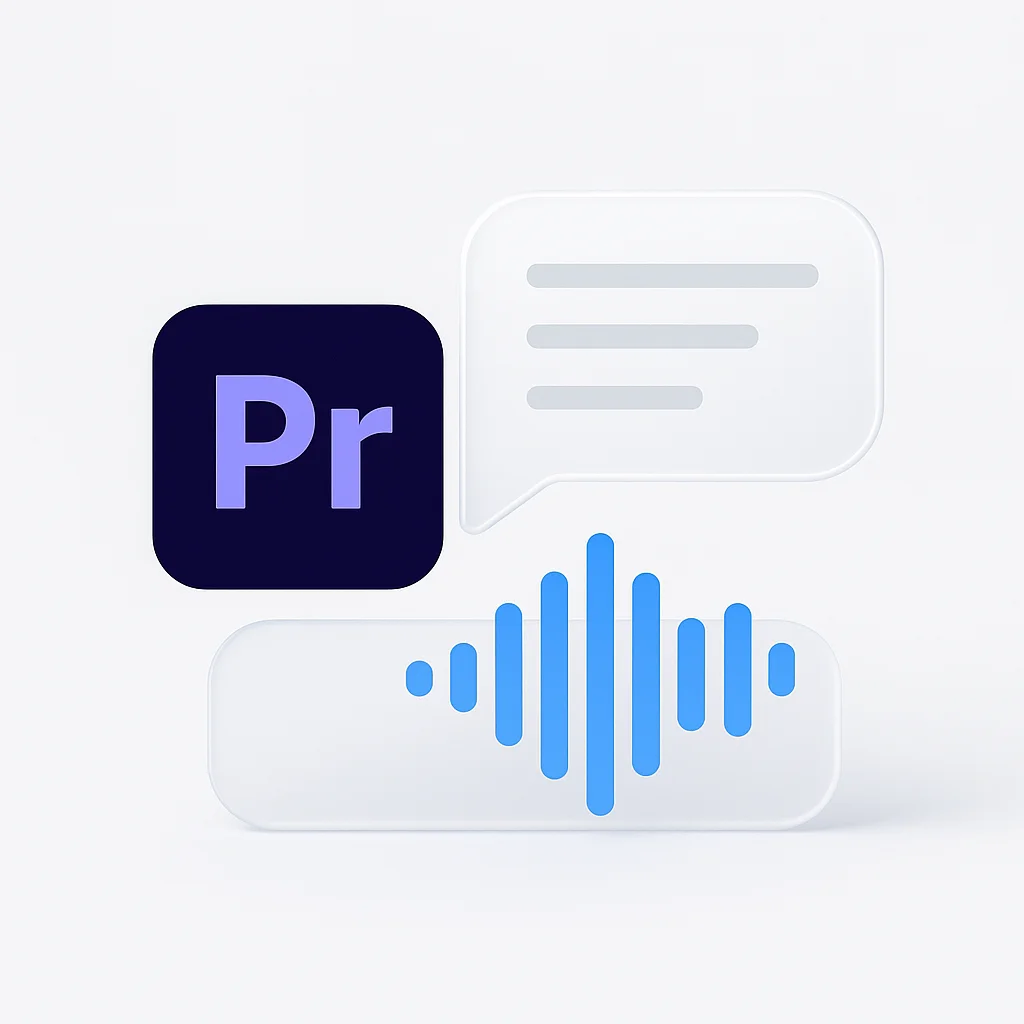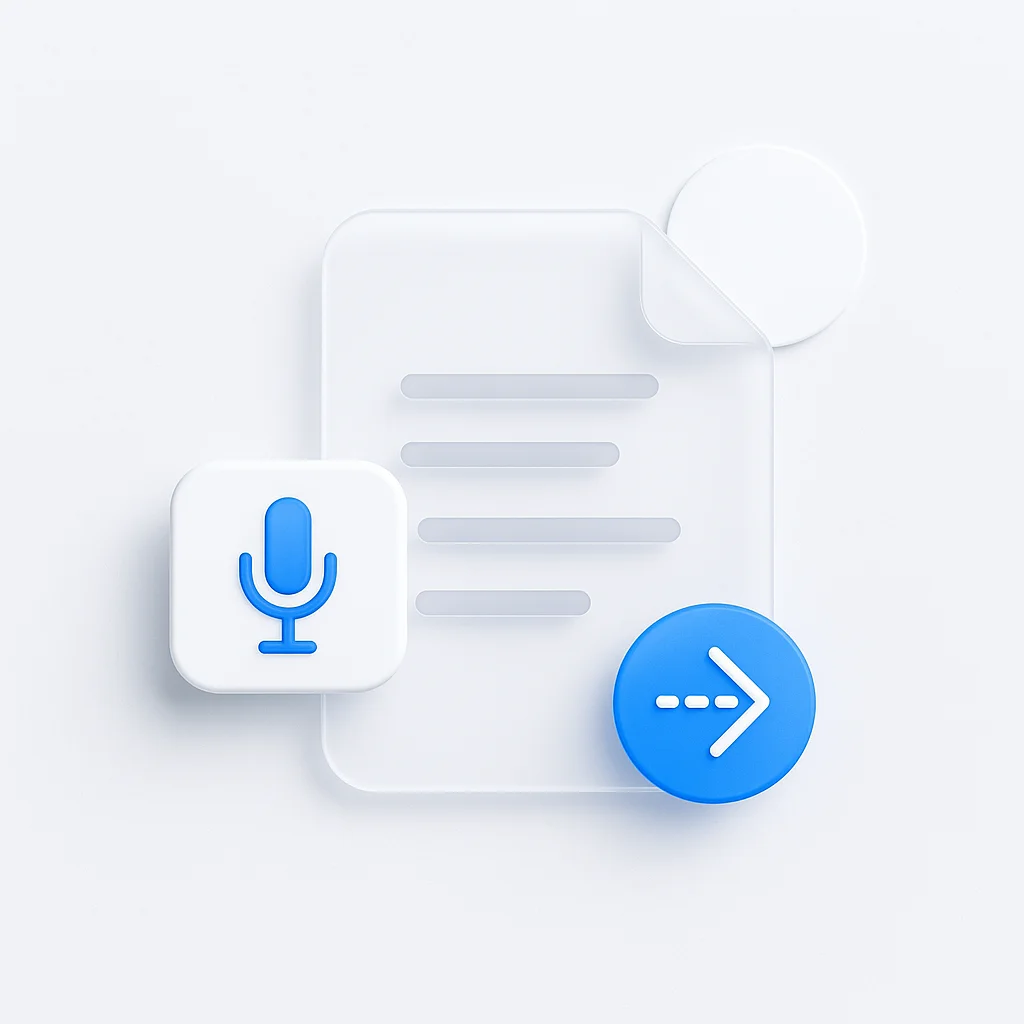Break the Scroll Cycle
Transform your relationship with technology and reclaim your focus with proven digital wellness tools.
Do you ever pick up your phone for a quick check, only to look up an hour later, lost in an endless scroll? You’re not alone. In 2025, this cycle of doomscrolling and distraction is a leading cause of procrastination and a major drain on mental well-being. This isn’t a lack of willpower; it’s a battle for your attention span.
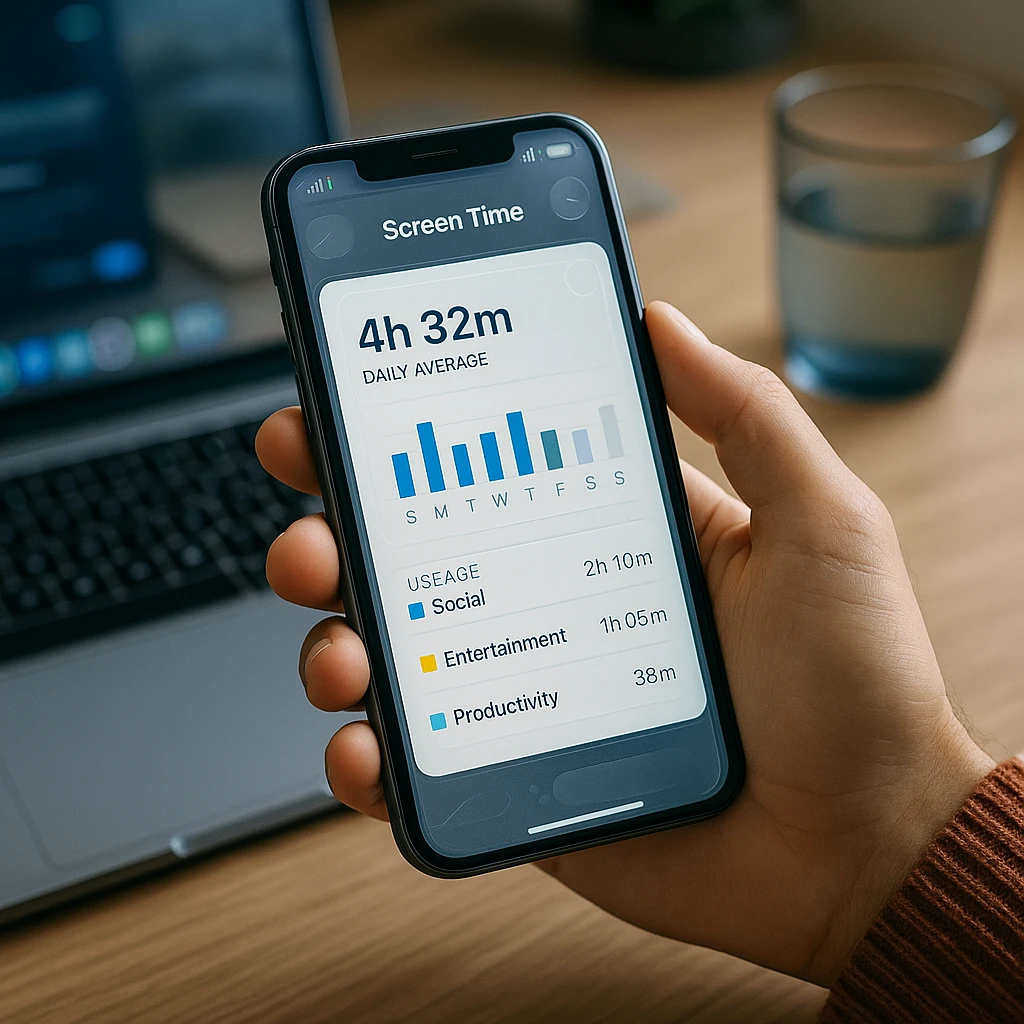
The good news is, you can fight back. A digital detox doesn’t mean throwing your phone away. It means using smart tools to break the cycle. The best apps to reduce screen time for adults act as your personal coach, helping you build healthier habits.
This guide reviews the 10 best tools for both iPhone and Android. We’ll cover everything from strict app blockers to mindfulness apps, helping you find the perfect solution to stop phone addiction and improve your focus.
Quick Picks: The Best App for Your Screen Time Goal
| Best For | App Name | Platforms | Key Feature |
|---|---|---|---|
| Strict, Cross-Device Blocking | Freedom | iOS, Android, Desktop | Blocks across all devices simultaneously |
| Breaking Mindless Habits | One Sec | iOS, Android | Forces pause before opening apps |
| Gamified Focus & Motivation | Forest | iOS, Android | Grow trees by staying focused |
| Powerful & Free (Built-in) | Apple Screen Time / Digital Wellbeing | iOS / Android | Native device controls |
How to Choose Your Strategy: Blocker vs. Mindfulness vs. Gamification
The Hard Blocker
For when you absolutely need to eliminate distractions for deep work. These are apps that lock your phone or specific sites with strict controls that are difficult to bypass.
Best for: Writers, students, professionals who need uninterrupted focus time
The Mindful Interruption
For breaking the subconscious habit of opening apps. These tools add a moment of friction to make you more intentional about your phone use.
Best for: People with ADHD, those trying to build awareness, gradual habit change
The Gamified Motivator
For users who respond well to positive reinforcement and visual progress. These apps turn focus into a game with rewards and achievements.
Best for: Students, competitive personalities, those who need external motivation
Start Here: The Powerful Digital Wellness Tools Already on Your Phone
How to Master Apple’s “Screen Time” for Adults (iOS)
Your iPhone comes with powerful built-in tools that most people never fully utilize. Apple’s Screen Time feature offers comprehensive control over your digital habits:
App Limits: Set daily time limits for specific apps or categories. Once you hit the limit, the app becomes unavailable until the next day.
Downtime: Schedule periods when only essential apps are available. Perfect for evenings or weekends when you want to disconnect.
Focus Modes: Create custom focus states that automatically limit notifications and app access based on your current activity.
Communication Limits: Ensure important calls and messages always get through while blocking other distractions.
To set up Screen Time effectively, start by reviewing your current usage patterns. Go to Settings > Screen Time > See All Activity to understand where your time goes. Then, set realistic limits that gradually reduce your usage rather than cutting it off completely.
How to Master Google’s “Digital Wellbeing” (Android)
Android’s Digital Wellbeing provides similar functionality with some unique features:
App Timers: Set daily limits for individual apps. When you reach the limit, the app icon grays out and becomes inaccessible.
Focus Mode: Temporarily pause distracting apps while keeping essential ones available. Perfect for work sessions or study time.
Bedtime Mode: Automatically switches your phone to grayscale and enables Do Not Disturb at your chosen bedtime. The grayscale feature is particularly effective at reducing visual appeal.
Wind Down: Gradually reduces notifications and switches to grayscale as bedtime approaches, helping you prepare for sleep.
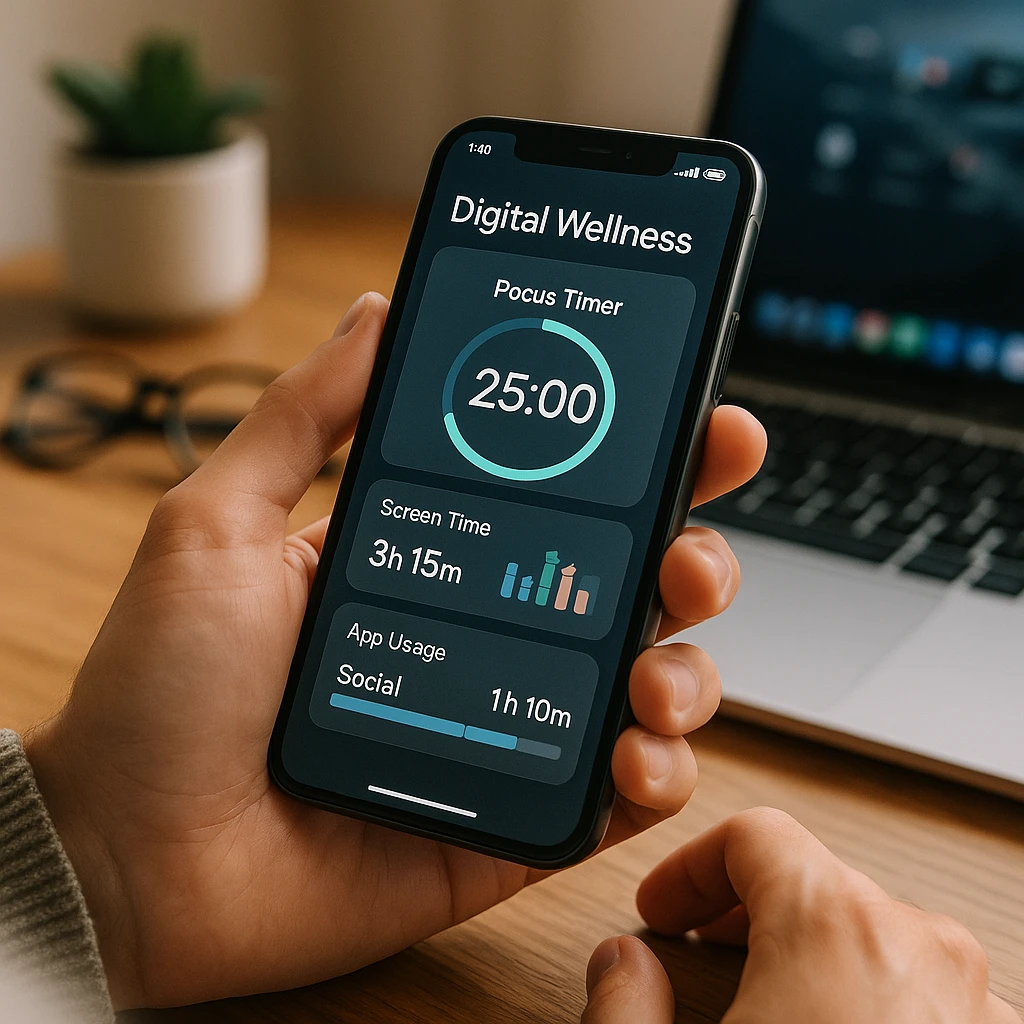
The grayscale feature is one of Digital Wellbeing’s most powerful tools. Research shows that removing color from your phone significantly reduces its appeal and helps break the habit of mindless checking.
The 10 Best Third-Party Apps to Limit Screen Time in 2025
Category A: The “Hard Blockers” (For Deep Focus)
Freedom
Best for: Blocking websites and apps across all your devices (phone, laptop, tablet) at once. Perfect for professionals and writers who need cross-device consistency.
Key Features:
- Cross-device synchronization
- Customizable blocking schedules
- Locked mode prevents bypassing
- Website and app blocking
AppBlock
Best for: A powerful and highly customizable website blocker for Android with advanced scheduling and detailed usage analytics.
Key Features:
- Advanced scheduling options
- Detailed usage statistics
- Multiple blocking modes
- Password protection
Opal
Best for: A beautifully designed app for creating strict, hard-to-bypass blocking sessions. Excellent for setting limits you can't easily override.
Key Features:
- Elegant, minimalist design
- Strong blocking mechanisms
- Focus session tracking
- Progress visualization
Category B: The “Mindfulness & Friction” Apps (For Breaking Habits)
One Sec
Best for: Breaking the mindless tapping cycle. It forces a pause and a deep breath before opening distracting apps. Highly effective for users with ADHD.
Key Features:
- Breathing exercises before app access
- Customizable pause duration
- App-specific settings
- Usage analytics
ScreenZen
Best for: Another great tool that adds a layer of intention, asking you why you're opening an app before it launches.
Key Features:
- Intentional opening prompts
- Customizable questions
- Usage tracking
- Gradual habit building
Category C: The “Gamified & Motivation” Apps (Making Focus Fun)
Forest
Best for: The classic focus app for students. Grow a virtual tree by staying off your phone; leave the app, and the tree dies.
Key Features:
- Virtual tree planting
- Real tree planting partnership
- Focus session tracking
- Beautiful forest visualization
Flora
Best for: Similar to Forest, but adds an accountability partner element by letting you grow a garden with friends.
Key Features:
- Social accountability
- Group focus sessions
- Shared garden progress
- Motivational challenges
Category D: The “Usage Trackers & Analyzers” (For Building Awareness)
StayFree
Best for: Provides detailed analytics on your phone usage, helping you understand the scope of your phone addiction.
Key Features:
- Detailed usage statistics
- App-specific analytics
- Usage patterns over time
- Goal setting and tracking
Moment / Balance
Best for: Connects your screen time habits to your overall mental health and wellness, providing holistic insights.
Key Features:
- Mental health correlation
- Wellness tracking
- Family screen time management
- Comprehensive reporting
The All-in-One Approach
BetterMe: Mental Health
Best for: Represents wellness apps that include guided digital detox challenges as part of a larger self-care program.
Key Features:
- Guided digital detox programs
- Mental health tracking
- Meditation and mindfulness
- Holistic wellness approach
Beyond Apps: 3 Proven Strategies & Low-Tech Alternatives
The “Grayscale” Challenge
One of the most effective low-tech solutions is the grayscale challenge. Both iPhone and Android offer this feature:
iPhone: Settings > Accessibility > Display & Text Size > Color Filters > Grayscale
Android: Settings > Digital Wellbeing > Bedtime Mode > Turn on grayscale
Research from Nature Scientific Reports shows that removing color from your phone can reduce usage by up to 40% within the first week. The visual appeal of colorful apps and notifications is significantly diminished, making it easier to resist the urge to check your phone.
Curate Your Home Screen
The “out of sight, out of mind” principle applies perfectly to digital wellness. Move distracting apps into folders off the main screen or to the second page of your home screen. Keep only essential apps like phone, messages, and calendar on your main screen.
This simple change can reduce mindless app opening by creating intentional friction. When you have to search for or navigate to a distracting app, you’re more likely to question whether you really need to use it.
Consider Low-Tech Solutions
For extreme cases, consider these physical solutions:
Minimalist Phone Launcher (Android): Apps like “Before Launcher” or “Olauncher” strip your phone down to the essentials, removing the visual appeal of app icons and notifications.
Phone Lock Box with Timer: Physical lock boxes with timers can be effective for deep work sessions or digital detox periods. Simply place your phone in the box and set the timer for your desired focus period.
Designated Phone-Free Zones: Create physical spaces in your home where phones are not allowed, such as the bedroom or dining area.
The Science Behind Screen Time Reduction
75%
of people report improved focus after implementing screen time limits
According to research from the American Psychological Association, excessive screen time is linked to increased stress, poor sleep quality, and decreased attention span. The average person checks their phone 96 times per day, with many of these checks happening within 15 minutes of waking up or going to sleep.
A study published in Computers in Human Behavior found that participants who used screen time tracking apps reduced their daily usage by an average of 2.5 hours within the first month, leading to improved sleep quality and reduced anxiety levels.
How ScreenApp Can Help with Digital Wellness
While ScreenApp is primarily known for its video recording and transcription capabilities, it can play a valuable role in your digital wellness strategy. By automating the capture and processing of important content, ScreenApp helps you:
Reduce Manual Screen Time: Instead of manually recording and transcribing meetings, ScreenApp’s Zero Click feature automatically captures important discussions, freeing you from the need to constantly monitor your screen.
Improve Meeting Focus: With AI-powered meeting notes, you can focus on the conversation rather than taking notes, reducing the cognitive load of multitasking.
Streamline Content Review: ScreenApp’s video summarization features help you quickly extract key insights without spending hours watching recordings.
This approach aligns with the principle that technology should serve your productivity goals rather than distract from them. By automating routine tasks, you can reclaim time for deep work and meaningful activities.
Frequently Asked Questions (FAQ)
Do screen time apps for adults actually work?
Yes, research shows that screen time tracking and limiting apps can be highly effective. A 2023 study found that users who consistently used these tools reduced their daily screen time by an average of 2-3 hours within the first month. The key is choosing the right approach for your personality and sticking with it consistently.
What is the best FREE app to block social media without a time limit?
For free social media blocking, your device's built-in tools are often the most effective. Apple's Screen Time and Google's Digital Wellbeing both offer free, powerful blocking features. For third-party options, AppBlock (Android) and Freedom (limited free version) provide robust free blocking capabilities.
How can I set screen time limits that I can't easily bypass?
Use apps with "locked mode" features like Freedom or Opal, which require a password or time delay to disable. Set up accountability by sharing your goals with a friend or family member. Consider using physical solutions like a phone lock box for the most strict approach.
What is the best focus app for an adult with ADHD?
One Sec is particularly effective for ADHD because it creates a moment of pause before opening apps, helping break impulsive habits. Forest's visual feedback and immediate consequences also work well for ADHD brains. Consider combining these with your device's built-in focus modes for maximum effectiveness.
Is it better to use a hard blocker like Freedom or a mindfulness app like One Sec?
It depends on your goals and personality. Hard blockers are better for deep work sessions and strict time limits. Mindfulness apps are better for building long-term awareness and changing habits gradually. Many people find success using both: hard blockers for work time and mindfulness apps for general use.
Related Digital Wellness Resources
For more insights on improving your digital habits, explore these related guides:
- Best AI Meeting Assistants for Teams - Automate meeting tasks to reduce screen time
- How to Take Meeting Notes Without Missing Anything - Focus on conversations, not note-taking
- Top Remote Work Software for Productivity - Tools to work more efficiently
- AI Tools for Productivity Enhancements - Automate routine tasks
Conclusion
In 2025, reclaiming your focus isn’t about willpower alone; it’s about building better systems. For deep work, a blocker like Freedom is your best ally. To break subconscious habits, One Sec offers a revolutionary approach. But the most powerful strategy is to start with the tools you already own—mastering Apple Screen Time and Google’s Digital Wellbeing.
The key to success is choosing the right approach for your specific needs and personality. Start by tracking your usage for one week to understand your habits. Then, pick one strategy or app from this list to implement. Remember, the goal isn’t to eliminate technology entirely, but to use it more intentionally and mindfully.
What’s your biggest screen time challenge? Share it in the comments below, and let’s build a community of people supporting each other in reclaiming their focus and digital wellness.
Ready to take control of your digital life? Start with one small change today.
